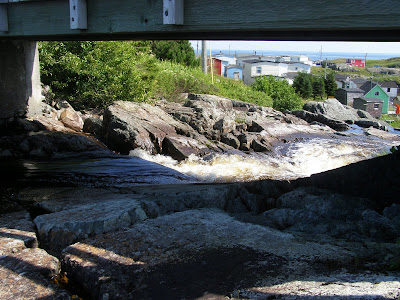*** Previous posts are on earlier pages (Link is at bottom of page). ***
As we leave Duck Island Harbor we spot a Moose on the hillside.

This is the outport of Grand Bruit. The name reflects its French heritage. It means 'Great Noise' which results from the large waterfall that runs through the town.


The residents of Grand Bruit had been resettled earlier this year. The populations of all outports have been declining due to the collapse of the fisheries. When the population of an outport becomes too small to warrant the expense, of the government, to maintain the utilities and ferry service, the residents are resettled in larger centers. We are told that their property is purchased at a fair price and the residents are allowed to rent their old homes back for a dollar a year. However, no transportation or services are provided. When we arrived in Grand Bruit there were only about five summer residents. The rest of the homes, often fully furnished, were locked up and abandoned.


This is the fire fighting equipment of the small village.

The water of the falls is the overflow from the pond above the village, which served as the town water supply.


As you can see, this is a very small harbor.

In this harsh climate, some of the building are already showing signs of decline.

A child's toy, or an adult's tool, of past times:

In addition to the traditional lobster pot designs, we came across these unusual six sided pots.

"Evergreen" at the fisherman's dock:

The bridge to the cemetery:

A plot with a view:

The outport village of Grand Bruit. As you can see there are no human imprints beyond.

Looking East along the coast:

This is some type of underground cellar - perhaps a root cellar.

These paved walkways are the streets of the village:

Every coastal town has a church, usually located on the high ground. The organ remained in the church, and was still functional.

Whale bones:

These "ways" are evidence of the previous intense fishing activity.


Hunting and fishing were the way of life for the villagers.

Back at the fisherman's dock, gear lay around, as if time had stopped.

Waiting for handouts:

The "Cramalot Inn" was the evening gathering spot.


Beautiful pictures, brings a tear to me eye. Thanks.
ReplyDeleteI grew up in this community. Our family left in 1997. It breaks my heart to know that it's deserted now, by the memories will always live on in my heart...
ReplyDelete